It's the most wonderful time of the year
"It's the Most Wonderful Time of the Year" is a popular Christmas song written in triple time in 1963 by Edward Pola and George Wyle. It was recorded and released that year by pop singer Andy Williams for his first Christmas album, The Andy Williams Christmas Album. However, the song was not released as a promotional single by Williams' record label (Columbia Records) that year, as they instead opted to promote his cover of "White Christmas" as the official promo single from the album.
website: https://www.youtube.com/watch?v=gFtb3EtjEic

The Twelve Days of Christmas
"The Twelve Days of Christmas" is an English Christmas carol that enumerates in the manner of a cumulative song a series of increasingly grand gifts given on each of the twelve days of Christmas (the twelve days that comprise the Christmas season starting with Christmas Day).The song, published in England in 1780 without music as a chant or rhyme, is thought to be French in origin."The Twelve Days of Christmas" has a Roud Folk Song Index number of 68. The tunes of collected versions vary. The standard tune now associated with it is derived from a 1909 arrangement of a traditional folk melody by English composer Frederic Austin, who first introduced the now familiar prolongation of the verse "five gold rings".
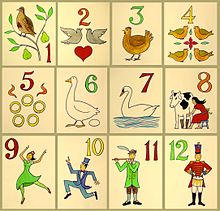
website: https://www.youtube.com/watch?v=oyEyMjdD2uk
The Twelve Days of Christmas
On the first day of Christmas
my true love sent to me:
A Partridge in a Pear Tree
On the second day of Christmas
my true love sent to me:
2 Turtle Doves
and a Partridge in a Pear Tree
On the third day of Christmas
my true love sent to me:
3 French Hens
2 Turtle Doves
and a Partridge in a Pear Tree
On the fourth day of Christmas
my true love sent to me:
4 Calling Birds
3 French Hens
2 Turtle Doves
and a Partridge in a Pear Tree
On the fifth day of Christmas
my true love sent to me:
5 Golden Rings
4 Calling Birds
3 French Hens
2 Turtle Doves
and a Partridge in a Pear Tree
On the sixth day of Christmas
my true love sent to me:
6 Geese a Laying
5 Golden Rings
4 Calling Birds
3 French Hens
2 Turtle Doves
and a Partridge in a Pear Tree
On the seventh day of Christmas
my true love sent to me:
7 Swans a Swimming
6 Geese a Laying
5 Golden Rings
4 Calling Birds
3 French Hens
2 Turtle Doves
and a Partridge in a Pear Tree
On the eighth day of Christmas
my true love sent to me:
8 Maids a Milking
7 Swans a Swimming
6 Geese a Laying
5 Golden Rings
4 Calling Birds
3 French Hens
2 Turtle Doves
and a Partridge in a Pear Tree
On the ninth day of Christmas
my true love sent to me:
9 Ladies Dancing
8 Maids a Milking
7 Swans a Swimming
6 Geese a Laying
5 Golden Rings
4 Calling Birds
3 French Hens
2 Turtle Doves
and a Partridge in a Pear Tree
On the tenth day of Christmas
my true love sent to me:
10 Lords a Leaping
9 Ladies Dancing
8 Maids a Milking
7 Swans a Swimming
6 Geese a Laying
5 Golden Rings
4 Calling Birds
3 French Hens
2 Turtle Doves
and a Partridge in a Pear Tree
On the eleventh day of Christmas
my true love sent to me:
11 Pipers Piping
10 Lords a Leaping
9 Ladies Dancing
8 Maids a Milking
7 Swans a Swimming
6 Geese a Laying
5 Golden Rings
4 Calling Birds
3 French Hens
2 Turtle Doves
and a Partridge in a Pear Tree
On the twelfth day of Christmas
my true love sent to me:
12 Drummers Drumming
11 Pipers Piping
10 Lords a Leaping
9 Ladies Dancing
8 Maids a Milking
7 Swans a Swimming
6 Geese a Laying
5 Golden Rings
4 Calling Birds
3 French Hens
2 Turtle Doves
and a Partridge in a Pear Tree
Auld Lang Syne
"Auld Lang Syne" (Scots pronunciation: [ˈɔːl(d) lɑŋˈsəin]: note "s" rather than "z") is a Scots poem written by Robert Burns in 1788 and set to the tune of a traditional folk song (Roud # 6294). It is well known in many countries, especially in the English-speaking world, its traditional use being to bid farewell to the old year at the stroke of midnight. By extension, it is also sung at funerals, graduations and as a farewell or ending to other occasions. The international Boy Scout youth movement, in many countries, uses it to close jamborees and other functions.

Sex and the City
Sex and the City is an American romantic comedy television series created by Darren Star and produced by HBO. Broadcast from 1998 until 2004, the original run of the show had a total of 94 episodes. Throughout its six-year run, the show received contributions from various producers, writers and directors, perhaps most significantly from Michael Patrick King.

Maleficent
Maleficent is a 2014 American dark fantasy film directed by Robert Stromberg from a screenplay by Linda Woolverton and starring Angelina Jolie, Sharlto Copley, Elle Fanning, Sam Riley, Imelda Staunton, Juno Temple, and Lesley Manville. Loosely based on Charles Perrault's original fairy tale and inspired by Walt Disney's 1959 animated film, Sleeping Beauty, Maleficent portrays the story from the perspective of the eponymous antagonist, depicting her conflicted relationship with the princess and king of a corrupt kingdom.

Cain and Abel
In Abrahamic religions, Cain and Abel (Hebrew: הֶבֶל ,קַיִן Qayin, Heḇel; Arabic: قابيل، هابيل Qābīl, Hābīl) were two of the sons of Adam and Eve.They worked as food producers for their family; Cain was a crop farmer, and Abel was a shepherd. When they sacrificed to God, he favored Abel's sacrifice over Cain's. Later, Cain killed Abel, committing the first murder. God expelled Cain, but lightened his punishment after Cain complained that his original punishment was too difficult to bear. Cain was the first person born, and Abel was the first to die.

Beowulf
Beowulf (/ˈbeɪoʊwʊlf, ˈbiːoʊ-/; Old English: [ˈbeːo̯ˌwulf]) is an Old English epic poem consisting of 3182 alliterative lines. It may be the oldest surviving long poem in Old English and is commonly cited as one of the most important works of Old English literature. A date of composition is a matter of contention among scholars; the only certain dating pertains to the manuscript, which was produced between 975 and 1025.The author was an anonymous Anglo-Saxon poet, referred to by scholars as the "Beowulf poet".
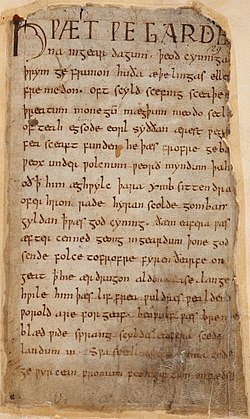

The Decameron
The Decameron (Italian: Decameron [deˈkaːmeron; dekameˈrɔn; dekameˈron] or Decamerone [dekameˈroːne]), subtitled Prince Galehaut (Old Italian: Prencipe Galeotto [ˈprentʃipe ɡaleˈɔtto; ˈprɛntʃipe]), is a collection of novellas by the 14th-century Italian author Giovanni Boccaccio (1313–1375). The book is structured as a frame story containing 100 tales told by a group of seven young women and three young men sheltering in a secluded villa just outside Florence to escape the Black Death, which was afflicting the city. Boccaccio probably conceived the Decameron after the epidemic of 1348, and completed it by 1353. The various tales of love in The Decameron range from the erotic to the tragic. Tales of wit, practical jokes, and life lessons contribute to the mosaic. In addition to its literary value and widespread influence (for example on Chaucer's The Canterbury Tales), it provides a document of life at the time. Written in the vernacular of the Florentine language, it is considered a masterpiece of classical early Italian prose.[1]
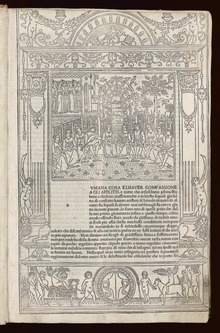
Frost
Frost is the coating or deposit of ice that may form in humid air in cold conditions, usually overnight. In temperate climates it most commonly appears as fragile white crystals or frozen dew drops near the ground, but in cold climates it occurs in a greater variety of forms. Frost is composed of delicate branched patterns of ice crystals formed as the result of fractal process development.

Machiavelli
Niccolò Machiavelli (Italian: [nikkoˈlɔ makjaˈvɛlli]; 3 May 1469 – 21 June 1527), or more formally Niccolò di Bernardo dei Machiavelli, was an Italian Renaissance historian, politician, diplomat, philosopher, humanist, and writer.He has often been called the founder of modern political science.He was for many years a senior official in the Florentine Republic, with responsibilities in diplomatic and military affairs. He also wrote comedies, carnival songs, and poetry. His personal correspondence is renowned in the Italian language. He was secretary to the Second Chancery of the Republic of Florence from 1498 to 1512, when the Medici were out of power. He wrote his most renowned work The Prince (Il Principe) in 1513.
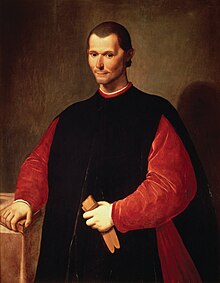
The Prince
The Prince (Italian: Il Principe [il ˈprintʃipe]) is a 16th-century political treatise, by the Italian diplomat and political theorist, Niccolò Machiavelli. From correspondence a version appears to have been distributed in 1513, using a Latin title, De Principatibus (About Principalities). However, the printed version was not published until 1532, five years after Machiavelli's death. This was done with the permission of the Medici pope Clement VII, but "long before then, in fact since the first appearance of The Prince in manuscript, controversy had swirled about his writings".
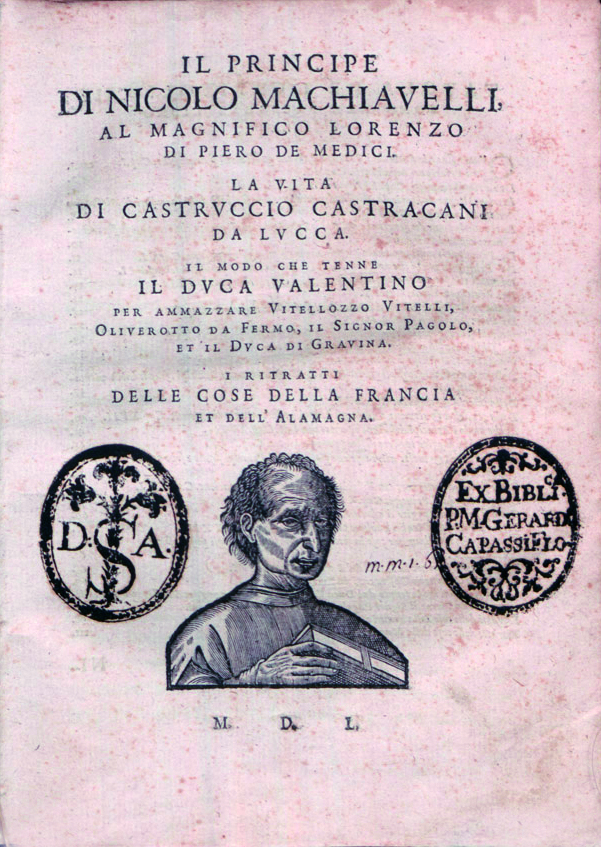
Republic (Plato)
The Republic (Greek: Πολιτεία, Politeia; Latin: De Re Publica is a Socratic dialogue, written by Plato around 380 BCE, concerning justice (δικαιοσύνη), the order and character of the just city-state and the just man. It is Plato's best-known work, and has proven to be one of the world's most influential works of philosophy and political theory, both intellectually and historically.
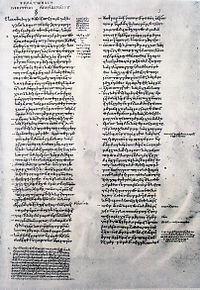

Dystopia
A dystopia (from the Greek δυσ- and τόπος, alternatively, cacotopia, kakotopia, or simply anti-utopia) is a community or society that is undesirable or frightening.It is translated as "not-good place", an antonym of utopia, a term that was coined by Sir Thomas More and figures as the title of his most well-known work, Utopia (the blueprint for an ideal society with minimal crime, violence and poverty). Dystopian societies appear in many artistic works, particularly in stories set in the future. Some of the most famous examples are George Orwell's 1984 and Aldous Huxley's Brave New World. Dystopias are often characterized by dehumanization, totalitarian governments, environmental disaster, or other characteristics associated with a cataclysmic decline in society. Dystopian societies appear in many subgenres of fiction and are often used to draw attention to real-world issues regarding society, environment, politics, economics, religion, psychology, ethics, science, and/or technology. Some authors however also use the term to refer to actually-existing societies, many of which are or have been totalitarian polities, or societies in an advanced state of collapse and disintegration. An attempt to draw together and compare both the fictional and real dystopias has been made in Gregory Claeys's Dystopia: A Natural History (Oxford University Press, 2016).

Thomas More
Sir Thomas More (/ˈmɔːr/; 7 February 1478 – 6 July 1535), venerated by Roman Catholics as Saint Thomas More, was an English lawyer, social philosopher, author, statesman and noted Renaissance humanist. He was also a councillor to Henry VIII, and Lord High Chancellor of England from October 1529 to 16 May 1532. He also wrote Utopia, published in 1516, about the political system of an imaginary ideal island nation.

Apocalypse
An apocalypse (Ancient Greek: ἀποκάλυψις apokálypsis, from ἀπό and καλύπτω, literally meaning "an uncovering") is a disclosure of knowledge or revelation. In religious contexts it is usually a disclosure of something hidden, “a vision of heavenly secrets that can make sense of earthly realities".
Hermes
Hermès International S.A., Hermes of Paris, or simply Hermès (French pronunciation: [ɛʁmɛs]; ) is a French high fashion luxury goods manufacturer established in 1837, today specializing in leather, lifestyle accessories, home furnishings, perfumery, jewellery, watches and ready-to-wear. Its logo, since the 1950s, is of a Duc carriage with horse. Nadège Vanhee-Cybulski is the creative director.

Mount Rushmore
Mount Rushmore National Memorial is a sculpture carved into the granite face of Mount Rushmore, a granite batholith formation in the Black Hills in Keystone, South Dakota, United States. Sculpted by Gutzon Borglum and his son, Lincoln Borglum, Mount Rushmore features 60-foot (18 m) sculptures of the heads of four United States presidents: George Washington (1732–1799), Thomas Jefferson (1743–1826), Theodore Roosevelt (1858–1919), and Abraham Lincoln (1809–1865).The entire memorial covers 1,278.45 acres (2.00 sq mi; 5.17 km2)and is 5,725 feet (1,745 m) above sea level.


week37
servile
sojourn
confront
volition
antipathy
tenable
austere
superfluous
felicitous
halcyon
The name is from Latin halcyon, alcyon, from Greek halkyon, variant (perhaps a misspelling) of alkyon "kingfisher," a word of unknown origin. The explanation that this is from hals "sea; salt" (see halo-) + kyon "conceiving," present participle of kyein "to conceive," literally "to swell" (see cumulus) probably is ancient folk-etymology to explain a loan-word from a non-Indo-European language. Identified in mythology with Halcyone, daughter of Aeolus, who when widowed threw herself into the sea and became a kingfisher.
iconoclast
Originally in reference to those in the Eastern Church in 8c. and 9c. whose mobs of followers destroyed icons and other religious objects on the grounds that they were idols. Applied to 16c.-17c. Protestants in Netherlands who vandalized former Catholic churches on similar grounds. Extended sense of "one who attacks orthodox beliefs or cherished institutions" is first attested 1842.
therapy
motivate
rationalize
nascent
phobia
erudite
vertigo
conductive
germane
week38
glib
trend
legerdemain
malleable
homogeneous
fatal
passe
procrastinate
Do not put off till tomorrow what can be put off till day-after-tomorrow just as well. [Mark Twain]
stagnant
capitulate
stigmatize
audacity
foist
tantalize
chicanery
docile
tacit
reticent
retort
week39
saga
imperturbable
belated
decrepit
vacillates
opprobrium
Machiavellian
unconscionable
pandemonium
Transferred sense "place of uproar" is from 1779; that of "wild, lawless confusion" is from 1865. Related: Pandemoniac; pandemoniacal; pandemonian; pandemonic.
staunch
vindicate
flay
demeanor
heinous
delineation
infraction
callous
vituperation
redress
turpitude
沒有留言:
張貼留言